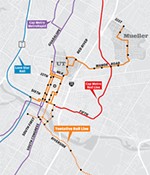Point Austin: Whistling for the Train
Mayor says latest bond delay just another stop on the line
By Michael King, Fri., March 19, 2010

But there's not one going my way.
– The Paul Butterfield Blues Band
I suppose there's some weird karmic balance working in the news that just as Capital Metro finally announces a start date for its Red Line commuter rail, the city announces that the bond referendum to support Downtown urban rail will not be happening this year. Despite Mayor Leffingwell's campaign pledge to get light rail going, after months of staff analysis he concluded that a November election can't happen. In his announcement last week, he cited four main reasons for the delay: 1) A route across Lady Bird Lake remains uncertain; 2) a system operator has not yet been identified; 3) planning for construction contingencies is incomplete; 4) the plan for future system build-out and funding needs more detail.
In a follow-up conversation, the mayor indicated that the first two obstacles are the most important – if you can't tell voters where the train will run and who will run it, they're likely to be highly skeptical. Initially, Leffingwell told me, he had hoped Phase 1 would not necessarily have to cross the river but would initially focus on Downtown circulation. "But the system needs a maintenance yard somewhere," he said, "and the only feasible sites, from a practical and economic standpoint, are south of the lake." While planners raised several landing options, southside landowners were not embracing the proposals with open arms. Leffingwell declined to name names, but it's no secret that one preferred route would have crossed east of Congress onto a tract currently owned by the Austin American-Statesman – or rather, Cox Enterprises Inc. Most major employers would in theory welcome a Downtown rail stop – to benefit their employees, relieve on-site parking demands, and not incidentally benefit the whole city. I guess traffic congestion in Austin is not high on the list of social priorities in Atlanta.
The Shadow Partner
The lack of a confirmed system operator is also vexing and calls attention to the fact that "urban rail" (in the public mind) is joined at the hip to "commuter rail" – and to Capital Metro's embarrassing history of stumbles on the way to the Red Line. If it finally proves reasonably successful – and the bar has been structurally set so low that hauling a few hundred subsidized suburbanites back and forth might well look like a sufficient pilot success – the reorganized agency may overcome its current taint to get back in the running as a potential city partner.
In the long run, all these "multimodal" parts will have to work together – Leffingwell reiterated that this project is "not about rail; it's about urban mobility" – and it's undeniably in the broadest public interest that Cap Metro finally get its act together as a reliable public agency and that it re-engage its primary mission to service the region's major population center. "Capital Metro's reputation has been tarnished," said Leffingwell, "and it may take another six months to a year either for the agency to rebuild its reputation or for us to identify another potential partner."
Down the Line
Although Leffingwell is keeping the door open for a May 2011 election – he says the major questions pending should be answered by the end of 2010 – for a couple of reasons, next November seems more likely. In the first place, the mayor simultaneously announced a general transportation bond vote, to include as much as $100 million for yet unspecified "roads, sidewalks, bike lanes, and trails." A May rail bond would likely look rushed and inevitably be criticized as relying on too narrow an electorate. Mark Nathan, the mayor's point man, insisted, "We're not taking our foot off the accelerator," but that serious planning can continue and public information be broadened while the bond is prepared over the next "nine months, 12 months, or even 18 if that's what it takes." He echoed Leffingwell in emphasizing that it's more important that it be done right than fast.
The politics remain volatile – and weren't calmed when the Statesman reported the long-term estimated $1 billion cost at full build-out, as though it were a current number and wouldn't also include federal transit money, now that the feds are officially more open to mass transit solutions. You can script the opposition now: "Another billion-dollar boondoggle." Leffingwell's response remains consistent: "Doing nothing is not an option."
Leffingwell said he recognizes that there remains a hard core of local opposition to any form of "rail" – "no rail, no way, no time, no place" – but that anyone who considers Austin's traffic problems seriously quickly realizes that there is "no magic-bullet" solution and that "different parts of town require different solutions."
"Even if we wanted to build more roads Downtown – for roads which are already at full capacity – there's no place to add or expand them. ... Rail offers an alternative that may be more expensive up front," he continued, "but in the long run represents greater operational efficiency per passenger load. It also drives the kind of residential density that makes mass transit work while building the tax base to support it."
"Do I love that it's been delayed?" responded transit consultant and public transportation activist Glenn Gadbois. "No. But the timeline to get it done is still on track, the mayor remains committed to it, and now we've got time to spread the word to people who support comprehensive solutions but who still aren't certain how rail fits."
We'll be hearing a lot of that over the next 12 months. Transit advocates will likely be in the curious position of cheering for the success of a Red Line that was always a lame, suburban-welfare alternative for the light rail project that Cap Metro bungled and the road warriors scuttled. "It's 10 years later," said Nathan, "and traffic certainly hasn't gotten any better. The opposition is still out there – but in the meantime, more people have either become actively engaged in supporting mass transit or are ready to accept rail as one solution."
Got something to say on the subject? Send a letter to the editor.










